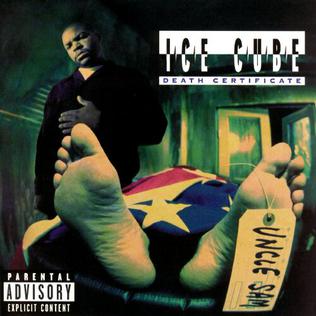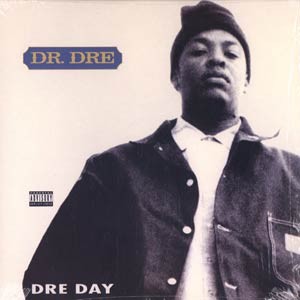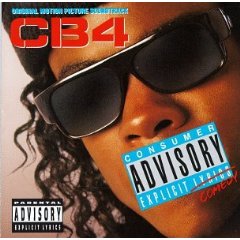Gangsta rap or gangster rap, initially called reality rap, is a subgenre of hip-hop that conveys the culture and values typical of urban gangs and street hustlers. Emerging in the late 1980s, gangsta rap's pioneers include Schoolly D of Philadelphia and Ice-T of Los Angeles, later expanding in California with artists such as N.W.A and Tupac Shakur. In 1992, via record producer and rapper Dr. Dre, rapper Snoop Dogg, and their G-funk sound, gangster rap broadened to mainstream popularity.

Tracy Lauren Marrow, better known by his stage name Ice-T, is an American rapper and actor. He is active in both hip hop and heavy metal. Ice-T began his career as an underground rapper in the 1980s and was signed to Sire Records in 1987, when he released his debut album Rhyme Pays. The following year, he founded the record label Rhyme $yndicate Records and released another album, Power (1988), which would go platinum. He also released several other albums that went gold, including The Iceberg/Freedom of Speech... Just Watch What You Say! (1989), O.G. Original Gangster (1991) and Home Invasion (1993).
N.W.A was an American hip hop group formed in Compton, California. They were among the earliest and most significant popularizers and controversial figures of the gangsta rap subgenre, and the group is widely considered one of the greatest and most influential groups in the history of hip hop music.

O'Shea Jackson Sr., better known as Ice Cube, is an American rapper, songwriter, actor, and film producer. His lyrics on N.W.A's 1988 album Straight Outta Compton contributed to gangsta rap's widespread popularity, and his political rap solo albums AmeriKKKa's Most Wanted (1990), Death Certificate (1991), and The Predator (1992) were all critically and commercially successful. He was inducted into the Rock and Roll Hall of Fame as a member of N.W.A in 2016.

Eric Lynn Wright, known professionally as Eazy-E, was an American rapper who propelled West Coast rap and gangsta rap by leading the group N.W.A and its label, Ruthless Records. He is often referred to as the "Godfather of Gangsta Rap".

Artis Leon Ivey Jr., known by his stage name Coolio, was an American rapper and chef. He was best known for his single "Gangsta's Paradise" (1995), which won a Grammy Award, and was credited for changing the course of hip hop by bringing it to a wider audience. Other singles included "Fantastic Voyage" (1994), "1, 2, 3, 4 " (1996), and "C U When U Get There" (1997). He released nine albums, the first three of which achieved mainstream success: It Takes a Thief (1994), Gangsta's Paradise (1995), and My Soul (1997). Coolio first achieved recognition as a member of the gangsta rap group WC and the Maad Circle. Coolio sold 4.8 million albums in the U.S.

Yolanda "Yo-Yo" Whitaker is an American rapper and actress.

100 Miles and Runnin' is an EP from the American gangsta rap group N.W.A. Released on August 14, 1990, this EP of five tracks reflects an evolution of N.W.A's sound and centers on the single "100 Miles and Runnin'." Two tracks, "100 Miles" and "Real Niggaz," incidentally incited N.W.A's feud with Ice Cube, who had left to start a solo rap career. The porno rap track "Just Don't Bite It," also drew notice. Pushing lyrical boundaries in its day, the EP went gold in November 1990 and platinum in September 1992.
Ken Lawrence is a nerdcore rapper who purports to be the late theoretical physicist Stephen Hawking rapping under the name MC Hawking.
Above the Law was an American hip hop group from Pomona, California, founded in 1989 by Cold 187um, KMG the Illustrator, Go Mack, and DJ Total K-Oss.

CB4 is a 1993 American satirical mockumentary black comedy film directed by Tamra Davis and starring Chris Rock. The film follows a fictional rap group named "CB4", named after the prison block in which the group was allegedly formed. The movie primarily parodies gangsta rap and the rap group N.W.A, as well as taking inspiration from This Is Spinal Tap. It contains short segments featuring celebrities and musicians such as Halle Berry, Eazy-E, Butthole Surfers, Ice-T, Ice Cube, Flavor Flav, and Shaquille O'Neal.
"Fuck tha Police" is a protest song by American hip hop group N.W.A that appears on the 1988 album Straight Outta Compton as well as on the N.W.A's Greatest Hits compilation. The lyrics protest police brutality and racial profiling and the song was ranked number 425 on Rolling Stone's 2004 list of the 500 Greatest Songs of All Time. In 2021, Rolling Stone re-ranked the song at number 190 in an updated list.
George Arthur "Rusty" Cundieff is an American film and television director, actor, and writer known for his work on Fear of a Black Hat (1993), Tales from the Hood (1995), and Chappelle's Show (2003–2006).

Death Certificate is the second studio album by American rapper Ice Cube. It was released on October 29, 1991, through Lench Mob Records and Priority Records. The production on the album was primarily handled by Sir Jinx, DJ Pooh and Ice Cube. The album was supported by two singles: "Steady Mobbin'" and "True to the Game".

"Fuck wit Dre Day (And Everybody's Celebratin')", or as a single titled "Dre Day", is a song by American rapper and record producer Dr. Dre featuring fellow American rapper Snoop Doggy Dogg, released in May 1993 as the second single from Dre's debut solo album, The Chronic. "Dre Day" was a diss track targeting mainly Dre's former groupmate Eazy-E, who led their onetime rap group N.W.A and who, along with N.W.A's manager Jerry Heller, owned N.W.A's record label, Ruthless Records. In "Dre Day" and in its music video, which accuse Eazy of cheating N.W.A's artists, Dre and Snoop degrade and menace him. Also included are disses retorting earlier disses on songs by Miami rapper Luke Campbell, by New York rapper Tim Dog, and by onetime N.W.A. member Ice Cube, although Dre, while still an N.W.A member, had helped diss Cube first. After "Dre Day," a number of further diss records were exchanged.
Dearon Thompson, known professionally as Deezer D, was an American actor, rapper and Christian motivational speaker. He is best known for his role as Nurse Malik McGrath in the American medical drama television series ER, and for his roles in the films CB4 and Fear of a Black Hat.

CB4 (Original Motion Picture Soundtrack) is the official soundtrack to the 1993 comedy film of the same name. It was released on March 2, 1993, through MCA Records. The album has peaked at #41 on the Billboard 200 and #13 on the Top R&B/Hip-Hop Albums. The album is composed of twelve R&B and hip hop tracks from various artists and producers. It spawned a Blackstreet-performed single "Baby Be Mine", which peaked at #17 on the Hot R&B/Hip-Hop Songs. Three songs on the album were credited to the fictional CB4 group from the movie, the trio consisted of Chris Rock and rappers Daddy-O & Hi-C.

American rapper Yo Gotti has released 11 studio albums, 25 mixtapes and 57 singles, and 5 promotional singles. After several guest appearances, mixtapes and independent releases, he released his major-label debut album Life, in 2003.
Comedy hip hop or comedy rap is a subgenre of hip hop music designed to be amusing or comedic, compared to artists who incorporate humor into their more serious, purist hip hop styles.

Straight Outta L.A., a 2010 documentary film in ESPN's 30 for 30 series directed by Ice Cube, covers the NFL team Raiders' time in Los Angeles, from 1982 to 1994, and how this overlapped with the local hip hop's transition from party jams to gangsta raps, a move led by the group N.W.A, which seized Raiders symbolism. The film premiered at the 2010 Tribeca Film Festival and aired on ESPN on May 11, 2010.












